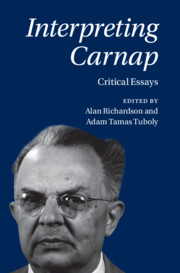Book contents
- Interpreting Carnap
- Interpreting Carnap
- Copyright page
- Contents
- Contributors
- Acknowledgments
- Abbreviations
- Introduction
- Part I Philosophy in New Dress
- Chapter 1 Carnap’s Noncognitivism
- Chapter 2 Carnap Is Not against Metaphysics
- Chapter 3 Interpreting Carnap’s Construction of the World
- Chapter 4 Philosophy in a Collective Spirit as “Politics in Its Broadest Sense”
- Part II Naturalism and Method
- Part III The Logical and the Linguistic
- Part IV Science and Theories
- Bibliography
- Index
Chapter 4 - Philosophy in a Collective Spirit as “Politics in Its Broadest Sense”
from Part I - Philosophy in New Dress
Published online by Cambridge University Press: 01 February 2024
- Interpreting Carnap
- Interpreting Carnap
- Copyright page
- Contents
- Contributors
- Acknowledgments
- Abbreviations
- Introduction
- Part I Philosophy in New Dress
- Chapter 1 Carnap’s Noncognitivism
- Chapter 2 Carnap Is Not against Metaphysics
- Chapter 3 Interpreting Carnap’s Construction of the World
- Chapter 4 Philosophy in a Collective Spirit as “Politics in Its Broadest Sense”
- Part II Naturalism and Method
- Part III The Logical and the Linguistic
- Part IV Science and Theories
- Bibliography
- Index
Summary
This chapter will discuss Carnap’s engagement with various social issues through the lens of his scientific world view, and connect it to Thomas Uebel’s argument that Carnap’s philosophy was intended to be “political in its broadest sense.” I will build on Uebel’s characterization of Carnap as someone who believed in philosophy as fundamentally a collective effort and show how that played out in several of his organizational efforts. For example, Carnap notably protested the loyalty oaths required by the University of California, refusing both a lecture invitation and a visiting professorship on those grounds, citing concerns about academic freedom. Later in his life, Carnap, together with AJ Ayer, Max Black, Herbert Feigl, Carl Hempel, and Morris Lazerowitz, wrote a letter in the New York Times urging that Nicolas Molina Flores and Eli de Gortari be set free; Carnap also visited Molina and de Gortari in Mexico in 1970 and reported on it for the Journal of Philosophy. I will consider the extent to which social involvement like this, reflected in concern for the intellectual community as a whole, can be seen as continuous with his commitments to philosophy as a collective enterprise, and how those ideas might improve the practice of philosophy generally.
Keywords
- Type
- Chapter
- Information
- Interpreting CarnapCritical Essays, pp. 70 - 86Publisher: Cambridge University PressPrint publication year: 2024
- 1
- Cited by

